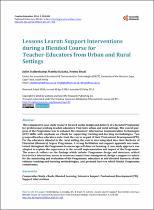Lessons learnt: support interventions during a blended course for teacher-educators from urban and rural settings
Abstract
This comparative case study research focused on the design and delivery of a blended Programme
for professional working teacher-educators from both urban and rural settings. The overall purpose
of the Programme was to enhance the educators’ Information Communication Technologies
(ICT) skills, with emphasis on eTools for supporting teaching-and-learning methodologies. Two
groups of teacher-educators undertook the course as part of their Professional Development (PD).
For the educators situated in the rural setting, the course was integrated into their Bachelor of
Education (Honours) Degree Programme. A strong facilitation and support approach was maintained
throughout the Programme to encourage self-directed learning. A case study approach was
adopted to explore the experiences in the overall implementation and impact of the Programme.
The research reflects on the findings which include: Programme design and structure; critical
face-to-face interaction; access to resources impact time management; design a support structure
for the monitoring and evaluation of the Programme; educators as self-directed learners; eTools
enhance teaching-and-learning methodologies; and personal barriers which hinder Programme
commitment.

